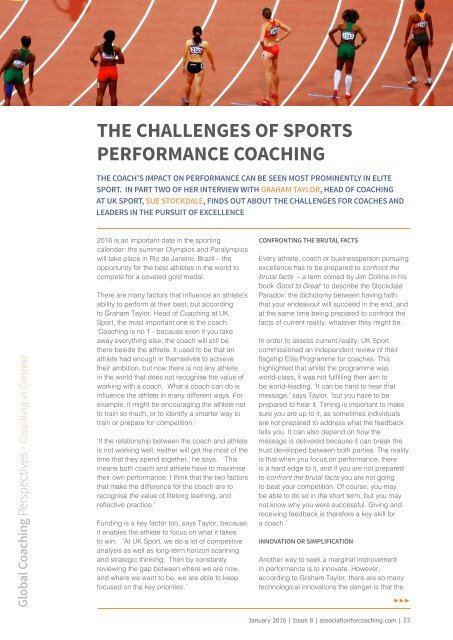Global Coaching Perspectives
bcth8
bcth8
Create successful ePaper yourself
Turn your PDF publications into a flip-book with our unique Google optimized e-Paper software.
The Challenges of Sports<br />
Performance <strong>Coaching</strong><br />
The coach’s impact on performance can be seen most prominently in elite<br />
sport. In part two of her interview with Graham Taylor, Head of <strong>Coaching</strong><br />
at UK Sport, Sue Stockdale, finds out about the challenges for coaches and<br />
leaders in the pursuit of excellence<br />
<strong>Global</strong> <strong>Coaching</strong> <strong>Perspectives</strong> - <strong>Coaching</strong> in Context<br />
2016 is an important date in the sporting<br />
calendar: the summer Olympics and Paralympics<br />
will take place in Rio de Janeiro, Brazil – the<br />
opportunity for the best athletes in the world to<br />
compete for a coveted gold medal.<br />
There are many factors that influence an athlete’s<br />
ability to perform at their best, but according<br />
to Graham Taylor, Head of <strong>Coaching</strong> at UK<br />
Sport, the most important one is the coach.<br />
‘<strong>Coaching</strong> is no 1 - because even if you take<br />
away everything else, the coach will still be<br />
there beside the athlete. It used to be that an<br />
athlete had enough in themselves to achieve<br />
their ambition, but now there is not any athlete<br />
in the world that does not recognise the value of<br />
working with a coach. What a coach can do is<br />
influence the athlete in many different ways. For<br />
example, it might be encouraging the athlete not<br />
to train so much, or to identify a smarter way to<br />
train or prepare for competition.’<br />
‘If the relationship between the coach and athlete<br />
is not working well, neither will get the most of the<br />
time that they spend together,’ he says. ‘This<br />
means both coach and athlete have to maximise<br />
their own performance. I think that the two factors<br />
that make the difference for the coach are to<br />
recognise the value of lifelong learning, and<br />
reflective practice.’<br />
Funding is a key factor too, says Taylor, because<br />
it enables the athlete to focus on what it takes<br />
to win. ‘At UK Sport, we do a lot of competitive<br />
analysis as well as long-term horizon scanning<br />
and strategic thinking. Then by constantly<br />
reviewing the gap between where we are now,<br />
and where we want to be, we are able to keep<br />
focused on the key priorities.’<br />
Confronting the Brutal Facts<br />
Every athlete, coach or businessperson pursuing<br />
excellence has to be prepared to confront the<br />
brutal facts – a term coined by Jim Collins in his<br />
book Good to Great 1 to describe the Stockdale<br />
Paradox: the dichotomy between having faith<br />
that your endeavour will succeed in the end, and<br />
at the same time being prepared to confront the<br />
facts of current reality, whatever they might be.<br />
In order to assess current reality, UK Sport<br />
commissioned an independent review of their<br />
flagship Elite Programme for coaches. This<br />
highlighted that whilst the programme was<br />
world-class, it was not fulfilling their aim to<br />
be world-leading. ‘It can be hard to hear that<br />
message,’ says Taylor, ‘but you have to be<br />
prepared to hear it. Timing is important to make<br />
sure you are up to it, as sometimes individuals<br />
are not prepared to address what the feedback<br />
tells you. It can also depend on how the<br />
message is delivered because it can break the<br />
trust developed between both parties. The reality<br />
is that when you focus on performance, there<br />
is a hard edge to it, and if you are not prepared<br />
to confront the brutal facts you are not going<br />
to beat your competition. Of course, you may<br />
be able to do so in the short term, but you may<br />
not know why you were successful. Giving and<br />
receiving feedback is therefore a key skill for<br />
a coach.’<br />
Innovation or Simplification<br />
Another way to seek a marginal improvement<br />
in performance is to innovate. However,<br />
according to Graham Taylor, there are so many<br />
technological innovations the danger is that the<br />
January 2016 | Issue 8 | associationforcoaching.com | 23


